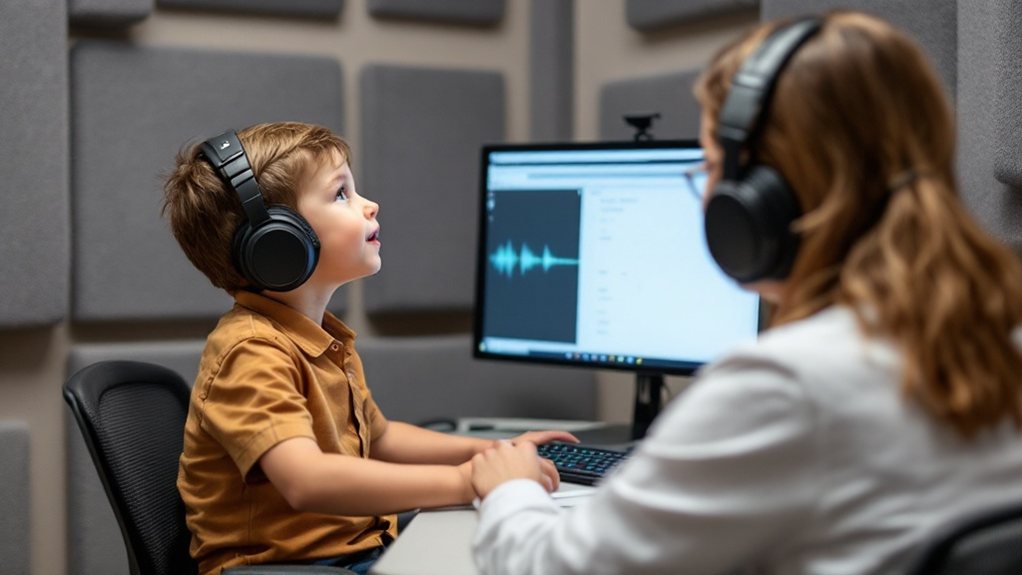Are you looking for Children Hearing Test Calamvale?
Ready to take the first step towards better hearing?
Let’s talk!
Connect with us today! Fill out the contact form below to schedule your personalised hearing consultation at All Things Hearing. Our expert team is committed to guiding you on your journey to improved hearing health. Don't wait to enhance your quality of life. Reach out now – we're here to listen and help!
Follow us:
Our main hearing clinic is located in Greenbank and our visiting sites are located in Daisy Hill, Jimboomba, Parkinson, and Wishart.
You’ll need to get your child’s hearing tested regularly, as untreated hearing issues can lead to permanent problems with speech, language, and social development. You should watch for signs like lack of response to sounds or difficulty with speech. It’s crucial to identify and treat hearing issues early.
At All Things Hearing, we provide hearing services in this area, including tests like pure-tone and speech tests for children. As you explore hearing tests for your child with us, you’ll find it’s just the start of understanding their hearing health and what you can do to support it.
Why Hearing Matters
Your child’s hearing is crucial for their overall development, and it’s essential you’re aware of its significance. It plays a vital role in their ability to communicate, learn, and interact with others. You’ll notice that hearing affects their speech and language development, as they learn to mimic sounds and words. If you’re not paying attention, you might miss subtle signs of hearing issues, which can impact their social and emotional growth.
You should understand that hearing loss can be permanent, but it’s often treatable. It’s crucial you identify any issues early on, so you can take action to address them. You’ll want to ensure your child receives regular hearing tests, as they can help detect potential problems. By being proactive, you can help your child develop strong communication skills and prevent any delays in their development. It’s essential you take your child’s hearing seriously, as it can have a lasting impact on their life.
Common Hearing Issues
Many children experience some type of hearing issue, and it’s likely you’ll encounter at least one of these common problems as your child grows. You may notice that your child has difficulty hearing soft sounds or can’t distinguish between similar sounds. Some common hearing issues in children include otitis media, a middle ear infection that can cause temporary hearing loss, and perforated eardrums, which can be caused by infection or injury.
As you monitor your child’s hearing, you’ll want to be aware of other potential issues, such as hearing loss in one ear or a significant difference in hearing between the two ears. You should also watch for signs of auditory processing disorder, which can make it hard for your child to understand speech in noisy environments. It’s essential to identify these issues early, so you can take steps to address them and ensure your child receives proper treatment. By being aware of these common hearing issues, you can help your child receive the support they need to develop strong communication skills.
Causes of Hearing Loss

Identifying common hearing issues in children is a significant step in addressing their hearing health, and now it’s time to explore what can cause these problems. You’ll find that hearing loss in children can be caused by genetic factors, infections, or exposure to loud noises. If you’re a parent, it’s essential to be aware of these potential causes to take preventive measures. For instance, you can ensure your child gets vaccinated against diseases like meningitis, which can lead to hearing loss.
You should also be mindful of your child’s exposure to loud sounds, as prolonged exposure can damage their hearing. If you’re concerned about your child’s hearing, it’s crucial to consult a healthcare professional. They can help you identify the cause of the problem and recommend the best course of action. By understanding the causes of hearing loss, you can take steps to protect your child’s hearing and prevent further damage. It’s crucial to address these issues early on to ensure your child’s hearing health is properly managed.
Signs of Hearing Problems
Someone noticing that a child doesn’t respond to sounds or can’t locate where a noise is coming from might be dealing with a potential hearing issue. You may notice that your child doesn’t turn their head when you call their name or doesn’t react to loud noises. They might also have trouble understanding what you’re saying, especially in noisy environments. If you’re talking to your child and they don’t respond, it’s possible they can’t hear you.
You should also pay attention to your child’s speech development. If they’re having trouble articulating words or speaking clearly, it could be a sign of a hearing problem. You might notice that your child is watching your lips closely when you talk, which could indicate they’re relying on lip-reading to understand what you’re saying. If you’ve noticed any of these signs, it’s essential to take your child to a doctor to rule out any underlying hearing issues. By being aware of these signs, you can take action early on to address any potential hearing problems.
Testing Your Child
If you’ve noticed signs of a potential hearing issue in your child, it’s time to take the next step and have their hearing tested. You’ll want to schedule an appointment with an audiologist or a hearing specialist who has experience working with children. They’ll use various tests to assess your child’s hearing, such as pure-tone tests, speech tests, or tympanometry.
You should prepare your child for the test by explaining what will happen in simple terms. Let them know that it’s a safe and painless process. During the test, you’ll likely be asked to stay with your child to help them feel more comfortable. The audiologist will use toys, pictures, or other visual aids to engage your child and make the experience more enjoyable. They’ll also take the time to answer any questions you have and provide you with feedback on your child’s hearing. It’s essential to follow the audiologist’s recommendations for any follow-up tests or evaluations.
Treatment Options Available
Fortunately, a range of effective treatment options are available to address hearing issues. You’ll find that these options can significantly improve your child’s ability to hear and communicate. If your child has a hearing issue, you’ll work with their doctor to determine the best course of treatment. This may involve medication, surgery, or other interventions, depending on the underlying cause of the issue.
You should discuss the treatment options with your child’s doctor to determine what’s best for them. They can help you understand the potential benefits and risks of each option. You’ll also want to ask about any follow-up care or monitoring that may be needed. It’s essential to follow the treatment plan carefully to ensure the best possible outcome. By working closely with your child’s doctor, you can help them get the treatment they need to address their hearing issue. You’ll be taking an important step towards helping your child communicate effectively.
Improving Hearing Ability

Once you’ve determined the best course of treatment for your child’s hearing issue, you’ll want to focus on improving their hearing ability. You’ll need to work closely with your child’s audiologist or hearing specialist to develop a plan that’s tailored to their specific needs. They’ll help you identify the most effective strategies for improving your child’s hearing, which may include speech therapy, auditory training, or other forms of rehabilitation.
You’ll also want to make sure your child is using their hearing aids or other devices correctly, and that they’re getting regular check-ups to monitor their progress. It’s also important to create a supportive environment that encourages your child to communicate effectively, such as reducing background noise and speaking clearly. By taking these steps, you can help your child improve their hearing ability and develop the skills they need to succeed in school and beyond. Regular follow-ups with their specialist will help track their progress.
Disclaimer
The content on our site is purely for education and should not be seen as an endorsement or recommendation of any treatments or products without a thorough hearing assessment and evaluation. Before starting any treatment, users should get advice from a professional and be fully aware of any potential side effects or risks related to the procedures. Any products we mention cannot be purchased by the public without first consulting a hearing health expert.
